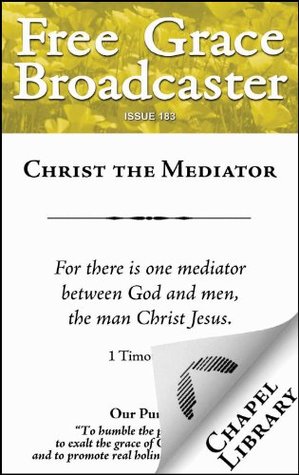- Bible
- Read the Bible
- Bible Versions
- Verse of the Day
- Reading Plans
- Verses by Topic
- Books of the Bible
- Bible Images
- Study
- Commentaries
- Concordances
- Dictionaries
- Encyclopedias
- Sermons
- Bible Atlas & Maps
- BP Wiki
- Devotionals
- Today's Devotionals
- Light of the World
- All Devotionals
- Inspirational Quotes
- More
- Picture Quotes
- Videos
- Inspirational
- Bible Study
- What The Bible Says
- Bible Q&As
- Daily Bread
- Bible by Genre
- Bible Stories
- Random Bible Verse
- Community
- Store
Free Grace Broadcaster - Issue 183 - Christ the Mediator
by Thomas Watson
Another quality eBook from Chapel Library. God is infinite and holy. Man is merely a creature, and a rebellious, sinful creature. What can bring God and man together--the one Mediator Jesus Christ. The office of Christ as Mediator is essential to our salvation as well as to our peace and spiritual comfort. Enjoy these articles on the subject:
Christ the Mediator of the New Covenant, by Thomas Watson (1620-1686).
Of Christ the Mediator, from the London Confession of 1689.
Of Christ's Offices in General, by Thomas Boston (1676-1732).
The Mediator of the Covenant Described in His Person, Nature, and Offices, by William Witaker (1548-1595).
A Mediator, by C.H. Spurgeon (1834-1892).
The Fulness of the Mediator, by John Gill (1697-1771).
Christ the Mediator of the New Covenant, by Thomas Watson (1620-1686).
Of Christ the Mediator, from the London Confession of 1689.
Of Christ's Offices in General, by Thomas Boston (1676-1732).
The Mediator of the Covenant Described in His Person, Nature, and Offices, by William Witaker (1548-1595).
A Mediator, by C.H. Spurgeon (1834-1892).
The Fulness of the Mediator, by John Gill (1697-1771).
BUY NOW
Kindle Edition, 70 pages
Published November 15th 2013 by Chapel Library
© 2025 Bibleportal.com All rights reserved.

He was educated at Emmanuel College, Cambridge, where he was noted for remarkably intense study. In 1646 he commenced a sixteen year pastorate at St. Stephen's, Walbrook. He showed strong Presbyterian views during the civil war, with, however, an attachment to the king, and in 1651 he was imprisoned briefly with some other ministers for his share in Christopher Love's plot to recall Charles II of England.
He was released on 30 June 1652, and was formally reinstated as vicar of St. Stephen's Walbrook. He obtained great fame and popularity as a preacher until the Restoration, when he was ejected for nonconformity. Not withstanding the rigor of the acts against dissenters, Watson continued to exercise his ministry privately as he found opportunity. Upon the Declaration of Indulgence in 1672 he obtained a license to preach at the great hall in Crosby House. After preaching there for several years, his health gave way, and he retired to Barnston, Essex, where he died suddenly while praying in secret. He was buried on 28 July 1686.
Thomas Watson was an English, non-conformist, Puritan preacher and author.
He was educated at Emmanuel College, Cambridge, where he was noted for remarkably intense study. In 1646 he commenced a sixteen year pastorate at St. Stephen's, Walbrook. He showed strong Presbyterian views during the civil war, with, however, an attachment to the king, and in 1651 he was imprisoned briefly with some other ministers for his share in Christopher Love's plot to recall Charles II of England.
He was released on 30 June 1652, and was formally reinstated as vicar of St. Stephen's Walbrook. He obtained great fame and popularity as a preacher until the Restoration, when he was ejected for nonconformity. Not withstanding the rigor of the acts against dissenters, Watson continued to exercise his ministry privately as he found opportunity. Upon the Declaration of Indulgence in 1672 he obtained a license to preach at the great hall in Crosby House. After preaching there for several years, his health gave way, and he retired to Barnston, Essex, where he died suddenly while praying in secret. He was buried on 28 July 1686.
... Show more